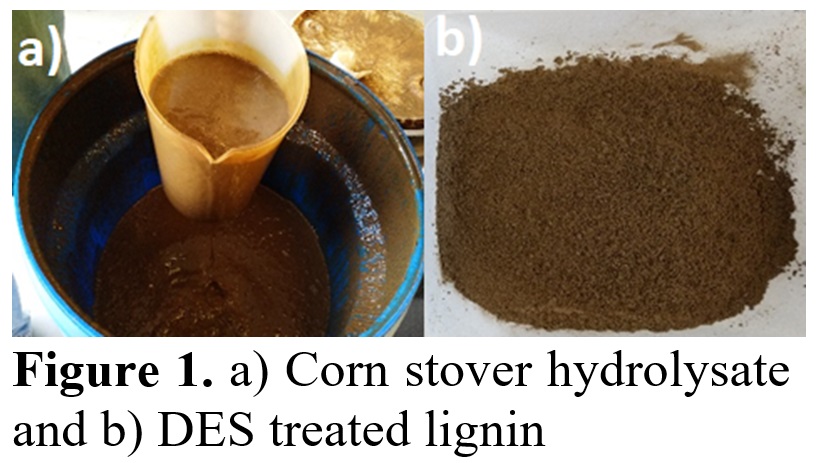(748a) Deep Eutectic Solvent Treatment of Corn Stover Hydrolysate for the Production of High Purity Lignin
AIChE Annual Meeting
2020
2020 Virtual AIChE Annual Meeting
Sustainable Engineering Forum
Value-Added Biorefinery Co-Products
Friday, November 20, 2020 - 8:00am to 8:15am
As the emerging biorefinery industry develops, a large volume of lignin-containing byproducts will become available. The proper utilization of such materials is essential for both the economic feasibility of the industry, and the environmental stability of future technologies. Corn stover hydrolysate is one such material, and exists as a byproduct of the production of bio-ethanol via enzymatic hydrolysis of the cellulose portion of the biomass. Corn stover hydrolysate is comprised of residual cellulose and hemicellulose, monomeric sugars, and the majority of the original biomass’s lignin. Lignin is of great interest to researchers in the field of bio-sustainability, as it is both the second most abundant material on Earth (after cellulose), and the only source of sustainable aromatic compounds. Traditionally, lignin has been burnt as a low value heating fuel for electricity generation, however, greater potential exists in using lignin to produce bio-plastic and bio-composite materials.
A DES system is the combination of two or more chemicals which act as either a hydrogen-bond acceptor (HBA), or a hydrogen-bond donor (HBD). The powerful solvation properties combined with a mild acid–base catalysis mechanism allow for the disruption of the lignocellulose matrix, resulting in the partial depolymerization and solubilization of the hemicellulose and lignin fractions. In this study, one such DES (choline chloride/lactic acid) was investigated for its potential to extract a relatively homogeneous (in terms of chemical composition and molecular weight distribution), and high purity lignin from corn stover hydrolysate.
Materials and Methods
Corn stover hydrolysate from the National Renewable Energy Laboratory (NREL) was received as a dilute solution, which was then air dried and ground into a fine powder feedstock for DES treatment. A portion of the dried hydrolysate was washed with warm water to remove the excess sugars and oligosaccharides present, in order to investigate their influence on lignin yield and purity.
The feedstock was mixed with one of three DES compositions and heated at 90-120 °C, for 1-6 h, resulting in the extraction and partial depolymerization of the lignin. After treatment, the lignin was precipitated from the mixture by the addition of water and then washed. In addition to the lignin, this work-up yielded a residual solid phase, as well as the dried DES for recycling.
The lignin and residual solid fractions obtained through the DES treatments were analyzed using the standard Klason lignin analysis process. This was performed in order to evaluate the purity of the lignin, as well as the efficiency of different treatment conditions.
Results and Discussion
The combination of lignin yield and Klason characterization allowed for the evaluation of reaction temperature, time, and DES composition, on the quantity and quality of lignin obtained from the corn stover hydrolysate. It was determined that a reaction temperature of 90 °C produced a maximum lignin yield of only 35 wt%, having a purity of 93%. Increasing the reaction time had little influence on the yield and purity of the lignin obtained, as did the DES composition used.
Increasing the treatment temperature to 120 °C improved the lignin yield without compromising purity. At this temperature, increasing the reaction time from 1 to 6 h also generally improved lignin yield without a loss of purity. Further increasing reaction time to 24 h showed no improvement in yield when compared to 6 h, indicating an idealized reaction time of ~6 h. The DES composition showed little impact on yield, however a higher ratio of choline chloride to lactic acid (5:1) produced lignin of slightly higher purity. At the relatively mild temperature of 120 °C and under atmospheric conditions,
Significance
This study has contributed to the new field of biomass treatment using DESs. A novel treatment process was developed for producing high purity lignin from a waste stream generated in the production of bioethanol. At the relatively mild temperature of 120 °C and under atmospheric conditions, lignin of ~94% purity was obtained at an extraction efficiency of ~65%. Due to its unusually high homogeneity and purity, this lignin has a greater potential for successful industrial application in the biopolymer field.
References
- Shen, X.J., et al., Facile fractionation of lignocelluloses by biomass-derived deep eutectic solvent (DES) pretreatment for cellulose enzymatic hydrolysis and lignin valorization. Green Chemistry, 2019. 21(2): p. 275-283.
- Mamilla, J.L.K., et al., Natural deep eutectic solvents (DES) for fractionation of waste lignocellulosic biomass and its cascade conversion to value-added bio-based chemicals. Biomass & Bioenergy, 2019. 120: p. 417-425.
- Alvarez-Vasco, C., et al., Unique low-molecular-weight lignin with high purity extracted from wood by deep eutectic solvents (DES): a source of lignin for valorization. Green Chemistry, 2016. 18(19): p. 5133-5141.

